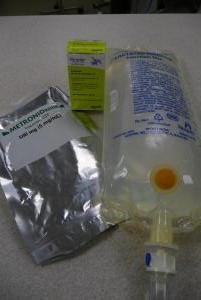Parvovirus in Dogs
- posted: Jan. 12, 2016

A Word About Parvovirus
Parvovirus is a deadly virus that affects mostly young, unvaccinated dogs. While cases seem to be more prevalent in the summer, we recently had a patient who tested positive for parvovirus at Christmas, so it can occur any time of year. The puppy was treated and recovered, but some puppies can die from this disease, so it should be taken very seriously.
Parvovirus attacks growing cells like those in the intestinal tract and the bone marrow. It causes profuse vomiting and bloody diarrhea and most affected dogs have a very low white blood cell count. The virus is highly contagious and spreads readily by contact with bodily fluids. The virus may be in the body for three to seven days before the puppy shows signs of being sick. Parvovirus is difficult to kill but is inactivated by dilute bleach and by freezing temperatures.
Since this is a virus, there is no direct treatment. Similar to the flu virus and other viruses, the body’s immune system must fight off the virus in order for the patient to recover. However, we can provide supportive care in the form of IV fluids to prevent dehydration, drugs to protect the gastrointestinal tract and to reduce nausea and vomiting, and nutritional support. While antibiotics will not directly kill the virus (or any virus) they are administered to prevent secondary bacterial infections that may occur due to a weakened immune system and due to bacteria that may leak out of the damaged intestinal tract causing sepsis or overwhelming infection. There is about a 75% recovery rate with proper treatment, but, for some puppies, the virus is fatal. Most puppies are hospitalized for three to five days and treatment often costs thousands of dollars.
Parvovirus was first discovered in the 1970s and is found in everywhere in every environment, so it is nearly impossible to prevent or shield dogs from exposure. However, there are very effective vaccines available, and all puppies should be properly vaccinated to prevent disease. Your puppy should receive a first vaccine between six to eight weeks of age, then every three to four weeks until he or she is 16 weeks old. The reason for this is that puppies do receive some antibodies from drinking their mother’s milk which protects them from disease. But those same antibodies can inactivate a vaccine, so multiple vaccines are needed to ensure the immune system can mount a proper response when exposed to a virus in the future.
In short, parvovirus is a potentially deadly virus causing severe vomiting and bloody diarrhea in young puppies or unvaccinated dogs. While we can’t prevent our dogs from coming in contact with parvovirus since it is everywhere in our environment, we can prevent dogs from becoming ill by properly vaccinating puppies and continuing a vaccine protocol every one to three years. Puppies can recover, but they need to be hospitalized in order to receive proper supportive care and care can be expensive so it is much more cost effective to have your pet vaccinated against parvovirus.
Let us know if you have any questions about parvovirus or if you need to set up an appointment to protect your pup with a parvo vaccine (parvovirus is part of our standard distemper or DHLPP vaccine).
This blog brought to you by the Patton Veterinary Hospital serving Red Lion, York and the surrounding communities.
Location
Patton Veterinary Hospital
425 E Broadway
Red Lion, PA 17356
